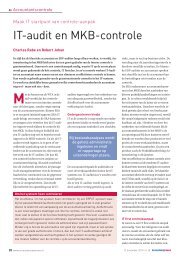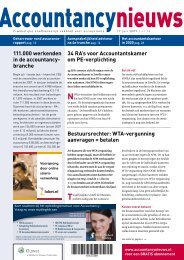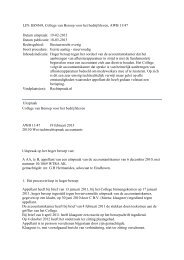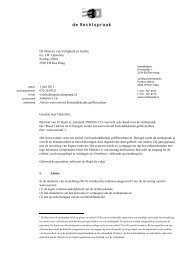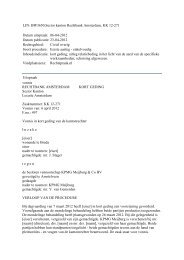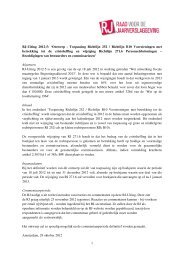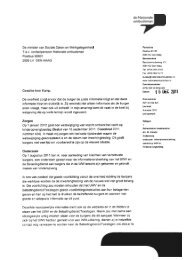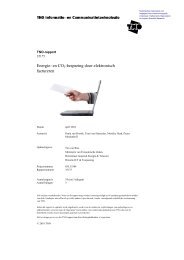Appetite for change - Accountancy Nieuws
Appetite for change - Accountancy Nieuws
Appetite for change - Accountancy Nieuws
You also want an ePaper? Increase the reach of your titles
YUMPU automatically turns print PDFs into web optimized ePapers that Google loves.
About PwC: Global Sustainability& Climate Change Tax NetworkThe global financial crisis has created extreme shorttermpressures on businesses, but they remain focusedon understanding the implications of climate <strong>change</strong> anddeveloping sustainable business strategies.Tax considerations are critical as businesses andgovernments collectively look to address these challenges.As governments around the world start to introduce taxes,incentives and regulation as a key component of their policiesaround sustainability and climate <strong>change</strong>, this presentsbusinesses with a range of new opportunities and risks. Thetax implications of these opportunities and risksrequire assessment.Opportunities include the chance <strong>for</strong> businesses to gaincompetitive advantage, <strong>for</strong> example by adapting theirbusiness models, technologies and product ranges in orderto become more sustainable, and in doing so, benefitingfrom the various incentives available to them. Risks includethe inability to adapt to what is required of businessesby consumers and governments, the costs of emissionstrading, and the reputational and financial risk of penalties <strong>for</strong>failing to observe, or comply with, environmental taxes andregulation, which are increasingly coming into play in differentjursidictions worldwide.From a business perspective, it is hard to keep track ofthese taxes and regulations emerging in response to climate<strong>change</strong>, as in most territories, they are still evolving. Inmany cases, the measures introduced are complex, not yetharmonised with other international legislation, and uncertainin terms of the potential tax impact.This is, perhaps, even more of an issue <strong>for</strong> businesses in thecurrent economic climate, with the added pressures on costcontroland risk management. Businesses need to be fullyaware of potential tax liabilities or implications in order to beable to manage these effectively, and should undoubtedly beasking themselves questions such as:• Which environmental taxes do we (or should we) currentlypay? How much are we paying in environmental taxes asa proportion of our total tax contribution?• Which environmental regulations do we need to complywith, around the world?• Are we proactively managing our exposure toenvironmental taxes and the tax impact ofenvironmental regulation?• Are we using the tax incentives available to us in eachcountry / region, and are we considering these as part ofour investment strategy?• What is the impact of changing consumer and businesspreferences in relation to our supply chain, businessmodel and product range? What are the tax implicationsof this?• Do we understand all the tax implications of the emissionstrading schemes which we (or one or more of our globalsubsidiaries) are part of, or have obligations under?• Have we properly scoped the tax implications of anyinvestments or projects either at home or in <strong>for</strong>eignjurisdictions (e.g. under the CDM) which have beenentered into as part of the corporate response to climate<strong>change</strong> and sustainability?At PwC, we have a dedicated team of advisers to supportbusinesses with these and many other important strategicand ethical challenges they face around climate <strong>change</strong> andsustainability in its broadest sense.



